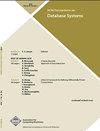工作负载驱动的反连接基数估计
IF 2.2
2区 计算机科学
Q3 COMPUTER SCIENCE, INFORMATION SYSTEMS
引用次数: 2
摘要
反连接基数估计是在关系查询优化器中无法实现准确有效的解决方案的少数问题之一。考虑到在分析工作负载中广泛使用反连接和基于子集的查询,以及针对连接基数估计(一个看似相关的问题)的广泛研究,缺乏反连接基数估计的适当解决方案是令人感兴趣的。在本文中,我们介绍了一种新的基于采样的反连接基数估计器,它(与现有的估计器不同)提供了足够的精度和效率,可以在查询优化器中实现。提出的估计器包含三个新颖的思想。首先,我们在离线学习数据的混合超人口模型时使用先前的工作负载信息。其次,我们设计了一个贝叶斯统计框架,根据实时查询更新超人口模型,从而允许估计器动态适应在线工作负载。第三,我们开发了一种有效的算法,用于从超几何分布中采样,以便生成蒙特卡罗试验,而无需显式实例化总体或样本。当把这些想法放在一起时,这些想法构成了一个有效的反连接基数估计器的基础,满足查询优化器的严格要求,正如在合成生成和大量TPC-H数据上的广泛实验结果所示。本文章由计算机程序翻译,如有差异,请以英文原文为准。
Workload-Driven Antijoin Cardinality Estimation
Antijoin cardinality estimation is among a handful of problems that has eluded accurate efficient solutions amenable to implementation in relational query optimizers. Given the widespread use of antijoin and subset-based queries in analytical workloads and the extensive research targeted at join cardinality estimation—a seemingly related problem—the lack of adequate solutions for antijoin cardinality estimation is intriguing. In this article, we introduce a novel sampling-based estimator for antijoin cardinality that (unlike existent estimators) provides sufficient accuracy and efficiency to be implemented in a query optimizer. The proposed estimator incorporates three novel ideas. First, we use prior workload information when learning a mixture superpopulation model of the data offline. Second, we design a Bayesian statistics framework that updates the superpopulation model according to the live queries, thus allowing the estimator to adapt dynamically to the online workload. Third, we develop an efficient algorithm for sampling from a hypergeometric distribution in order to generate Monte Carlo trials, without explicitly instantiating either the population or the sample. When put together, these ideas form the basis of an efficient antijoin cardinality estimator satisfying the strict requirements of a query optimizer, as shown by the extensive experimental results over synthetically-generated as well as massive TPC-H data.
求助全文
通过发布文献求助,成功后即可免费获取论文全文。
去求助
来源期刊

ACM Transactions on Database Systems
工程技术-计算机:软件工程
CiteScore
5.60
自引率
0.00%
发文量
15
审稿时长
>12 weeks
期刊介绍:
Heavily used in both academic and corporate R&D settings, ACM Transactions on Database Systems (TODS) is a key publication for computer scientists working in data abstraction, data modeling, and designing data management systems. Topics include storage and retrieval, transaction management, distributed and federated databases, semantics of data, intelligent databases, and operations and algorithms relating to these areas. In this rapidly changing field, TODS provides insights into the thoughts of the best minds in database R&D.
 求助内容:
求助内容: 应助结果提醒方式:
应助结果提醒方式:


